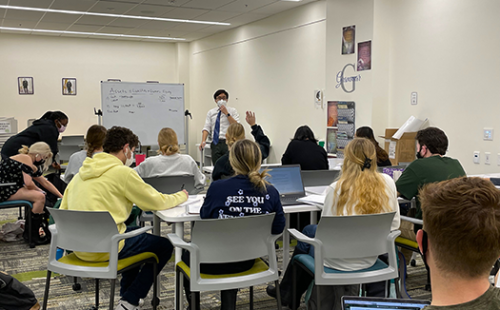
Supplemental Instruction ("SI"), created at the University of Missouri-Kansas City, is an internationally recognized academic support program and has been proven to increase student success for those who engage in the learning process. Its aim is to assist students academically by integrating "what to learn" with "how to learn." SI Sessions are led and organized by student peer leaders, or "SI Leaders," who have done academically well in the course and have been recommended by the professor. In these regularly scheduled, voluntary, out-of-class review sessions, known as "SI Sessions," students work collaboratively in reading discussions, solving practice problems, comparing notes, preparing for tests, and sharing ideas for improving learning. At Tulane, students see the best GPA outcomes when they attend five or more SI sessions. SI targets historically difficult courses (HDC), gateway courses with larger class sizes, and courses with above-average rates of Ds, Fs, and withdrawals. The program is run by a Senior Program Coordinator and two student Captains, former SI leaders who have demonstrated outstanding leadership skills.
Learn More
SI schedules are posted usually on Canvas after the first week of class. If you are in an SI class, your SI Leader will send out a poll to choose the best times for your weekly sessions. Please respond to the poll so your SI can pick a time that is convenient for most people. If you are unsure if you have an SI leader or not, please first check your course's Canvas page, and if you still do not know, please email altc@tulane.edu.
SI sessions are free and open to all students in a course, even if they are not enrolled in the specific section assigned to an SI Leader. Please note, however, that different sections may move through the material at a different pace or in a different order. Check with the SI leader for the section to determine if they are covering the same material.
SI sessions are a valuable part of the study process because they build regular review into a class's schedule and utilize the best research-supported learning methods like social interaction, collaborative learning, and active discussion in a safe and welcoming learning environment. SI leaders are trained to use a range of techniques that support different learning styles and provide a context and purpose for learning. They also model good study practices for that specific discipline, and help students build better learning skills.
The SI program is a non-remedial program. SI sessions are a proactive strategy that improves learning, and they are not meant to address major gaps in knowledge or understanding. Missed classes or major difficulties understanding a concept are better addressed through peer tutoring. Students who make SI session attendance a regular part of their study practice typically have better grades in the course, but the true purpose of SI is to promote a higher level of understanding in that discipline, build good study habits, and build community among students.
Come to the session prepared. Bring your notes, textbook if needed, course materials, laptop, and any questions you have.
Be present and engaged. Actively participate in the activities, take notes, and pay attention. Get to know your SI Leader and other students in the session, and remember that everyone is learning together, both contributing and receiving instruction.
Be respectful of others’ time and boundaries, both in the session and with your SI Leader. Remember that your SI Leader is a student with their own commitments and will not respond quickly or outside of reasonable hours. Each SI leader sets rules and expectations for group chats, emails, and Canvas messages.
SI Leaders are students just like you who have done well in the class, usually receiving an A in the course. They return to attend class alongside a new cohort of students and hold two weekly review sessions outside of class.
Your SI Leader will introduce themselves during the first week of class and post announcements on Canvas and/or group chat. They will poll the class to find the best time to hold sessions.
SI Leaders work closely with the course instructor to align their session with the syllabus and class expectations. They do not grade or otherwise evaluate students in any way.
SI Leaders want to support you and your learning journey whether you are struggling or not. They are available to answer questions and concerns and maintain a safe and welcoming environment for all students in their sessions. The program encourages a growth mindset and promotes learning as a creative and dynamic process.
There are two paths to becoming an SI Leader:
- A professor nominates you for their course. You will be contacted by the Senior Program Coordinator for SI and invited to apply.
- You contact the ALTC at ALTC.SI@TULANE.EDU to inquire about a particular class and whether there are openings available. If there is an opening, and the course instructor approves your candidacy, you will be invited to apply.
Once your application is submitted and approved, you will be contacted for an interview. The application is open for a limited time at the end of the semester for the following semester. The SI team does not accept applications on a rolling basis.
SI Leader openings are limited and vary from semester to semester. The application process is a competitive one, and we look for individuals who:
- Want to support fellow students
- Have educational or leadership experience
- Are committed to a welcoming learning environment
- Demonstrate a growth mindset in their own learning and teaching
- Exhibit academic excellence which is not limited exclusively to GPA or grades. A successful SI Leader understands what it takes to learn difficult material and overcome learning challenges.
